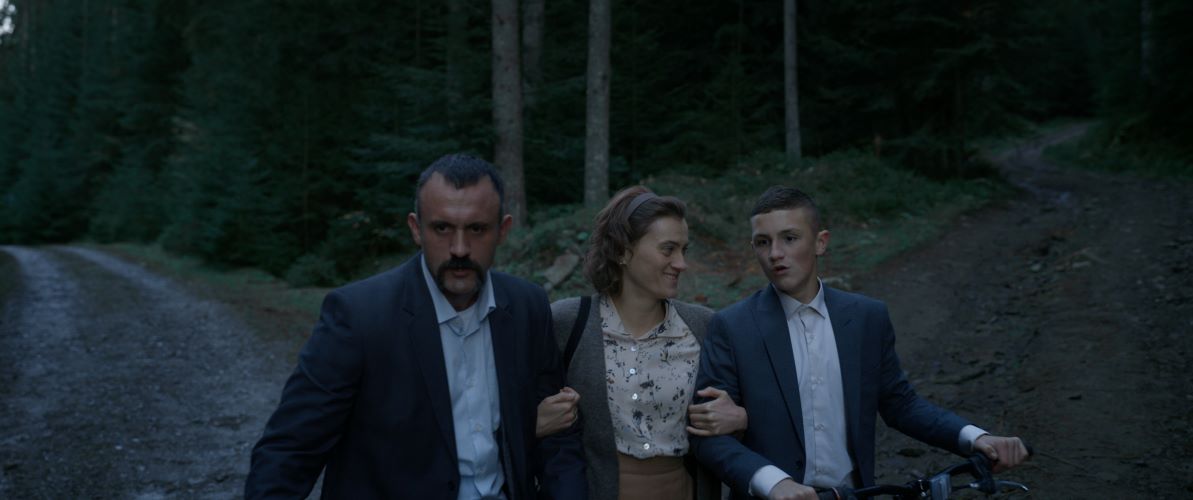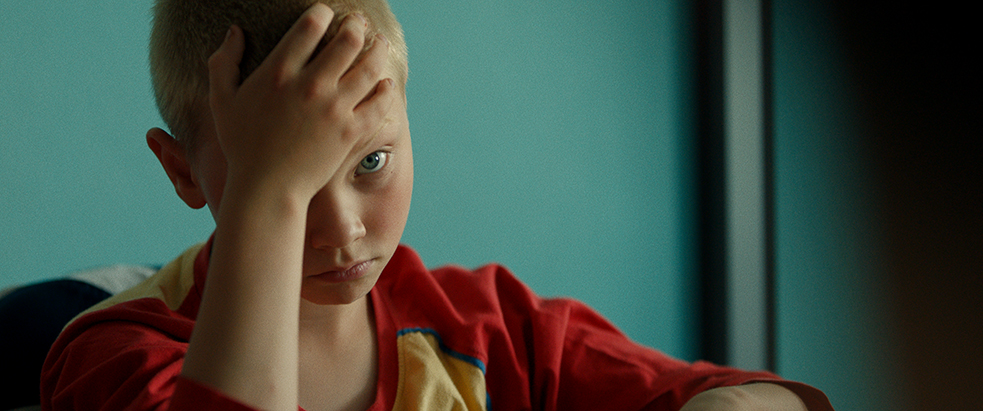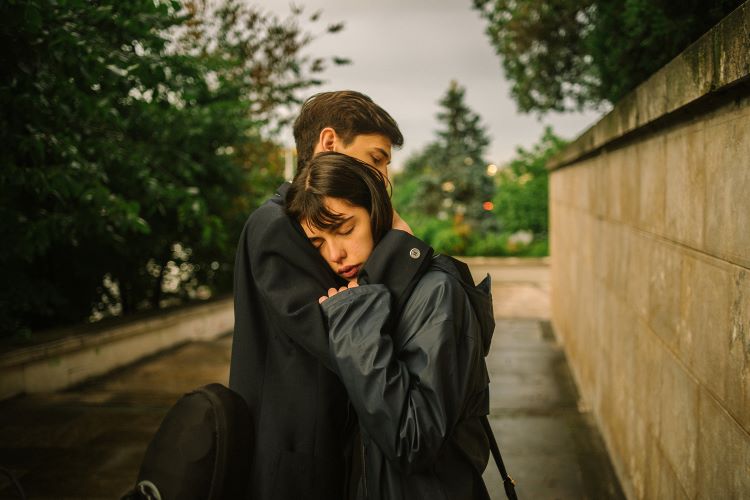The Arava International Film Festival will take place from November 9 – 19, 2022, in the Ashush Natural Reserve in the Arava region of the Southern Negev. Connecting nature and culture, a diverse program of international and Israeli films will be shown on a giant screen under the night sky.
Here’s a closer look at a selection of the festival films – all three are debuts:
Pamfir

Director Dmytro Sukholytkyy-Sobchuk hails from Western Ukraine, and Pamfir, his debut feature, is imbued with his intimate knowledge of the place, its people, their lives and customs. The film opens with a startling and somewhat ominous image: a masked man clothed in a straw cloak, sits in a dark shed and beckons to Nazar, a teenage boy. He approaches, thinking it is his uncle Victor, but soon realizes, happily, that it is his father Leonid, nicknamed Pamfir, who has returned after a long absence. The costume is part of the celebration of Malanka, a Ukranian folk tradition, a carnival that takes place around New Year’s.
Secrets, lies, and the dangers hidden beneath the surface mar the happiness of Pamfir’s life, already made difficult by the poverty of the region. He supports his family by working abroad in Poland, coming home for brief visits, yet the long absences put a strain on family relationships. Oleksandr Yatsentyuk is a strong onscreen presence as Pamfir, tall and broad, he carries the weight of his family, and will do whatever it takes to protect his wife Olena (Solomiya Kyrylova) and son Nazar (Stanislav Potyak). Teenage Nazar shows the stress of growing up without a father’s guidance, rebelling against his devout mother’s implorations that he join the choir, yet excited about the approaching carnival and working hard on making masks. There is a sad and violent chapter in the family’s past, and Pamfir is estranged from his own father, although he and Victor have a close, affectionate relationship with their mother. The dearth of local employment drives many to take to smuggling to make a living. Pamfir has renounced smuggling at Olena’s wishes, yet he still struggles to find a way to support his family and be with them.
When Nazar causes the prayer house to burn down, Pamfir takes responsibility, and promises to pay for the damage. Although in some ways the film falls into the conventions of a familiar narrative – the ex-criminal who takes on one last job – the vivid characters, creative visuals, and the specificity of the local culture give the film depth and impact. The film is steeped in a sense of hidden danger, which the director expresses in creative ways – most striking a scene when Pamfir, Olena, and Nazar are walking through the woods, and the rising fear and tension merge with the exhilaration and joy of being together.
The Worst Ones

The debut feature by Lise Akoka and Romane Gueret, The Worst Ones, winner of the Prix Un Certain Regard at the 2022 Cannes festival, explores the encounter between young people growing up in the Picasso Project, a working-class suburb in Northern France, and Gabriel, the Belgian film director who comes with his crew to make a movie in and about the neighborhood. A strong sense of mise en abyme permeates the film, as the distinctions between film and reality are blurred, especially in the film’s very striking opening scene depicting the auditions. As Akoka and Gueret cast non-professional actors for their film, one might almost think that the opening is a documentary segment, depicting their own casting process.
The four young people interviewed are very different from one another, yet all four have a powerful onscreen presence, literally filling the screen as the camera comes in close. The feeling is at once intimate and predatory, as they are so exposed, yet each in his or her own way is a force to contend with. 17-year-old Jessy (Loïc Pech) has just finished a three-month sojourn in jail for a hit and run offense as well as driving without a license. Resilient, he says that being chosen for the audition has cheered him up. Lily (Mallory Wanecque) is bright and lively, chatting freely and openly about dumping her boyfriend for being too controlling, she appears confident and radiant. Maylis (Mélina Vanderplanck) on the other hand, is a black box, her affectless tone and countenance reveal nothing of her feelings, yet she is very honest and direct, telling Gabriel “sounds like you’re only taking the worst ones”. Maylis expresses the concerns of the neighborhood, worried that the film will make them look bad, a neighborhood of poverty, family strife and young delinquents. Most touching is the interview with Ryan (Timéo Mahault), the youngest one in the cast. Fresh from yet another schoolyard fight, covered in bruises and scratches, he shifts and fidgets constantly, a storm of movement. Ryan has been living with his sister for the past six months, but his mother is trying to regain custody. Ryan is struggling to survive his circumstances and his feelings.
The Worst Ones explores the impact of making a film on these young people, raising questions of ethics and responsibility. Is Gabriel (Johan Heldenbergh) exploiting them, exposing painful aspects of their lives to make “poverty porn”? Yet at the same time this experience gives them a voice, and the potential for discovering new talents and abilities, as well as exposing them to a wider world through their interactions with the film crew. There are scenes that cross red lines, as when Gabriel uses knowledge of Ryan’s home life to manipulate his performance, with violent results. Yet there is also camaraderie that develops among the crew and actors, as sound man Victor (Matthias Jacquin) mocks and mimics Gabriel’s artistic angst, much to Ryan’s delight. But these friendships raise questions in themselves – are they just temporary, for the length of the shoot? Is there an inherent imbalance of power between the adults in the film crew and the young actors that makes this friendship problematic, with the young person more malleable, susceptible to influence, and possibly reading more into the friendship than is intended? The film offers much food for thought, and is illuminated by powerful, moving performances from the young actors.
Metronom

The complexity and anguish of youth growing up under an oppressive regime is depicted in Alexandru Belc’s feature debut Metronom, winner of the Un Certain Regard award for directing at the 2022 Cannes Film Festival.
Set in 1972 Romania, under the rule of Communist leader Nicolae Ceaușescu, the coming-of-age story is depicted entirely from the perspective of Ana (Mara Bugarin), a teenager in love. The film opens with a classic romantic image as Ana stands in the early morning’s gray light, traces of a recent rainfall wet on the pavement, against the backdrop of a frieze celebrating military heroes, she awaits her beloved. Sorin (Serban Lazarovici) does not disappoint, he arrives and the two embrace. Yet Ana weeps, and one soon learns the reason for her tears: Sorin and his mother are leaving Romania to join his father in Germany.
It’s Romeo and Juliet with a twist, for the circumstances of these star-crossed lovers are more complex, entangled with wider political and moral considerations. Belc takes his time to develop the narrative, closely following events from Ana’s lovelorn perspective, enhancing the suspense and impact as the viewer experiences Ana’s awakening knowledge and understanding.
The full program and ticket information may be found on the Arava International Film Festival website.





